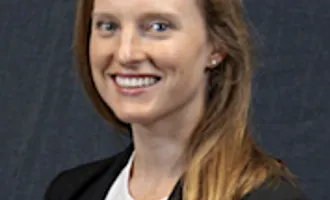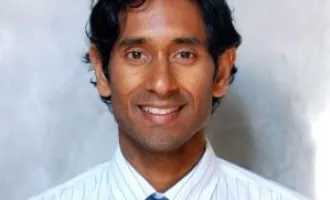Life of a Dental Student: Fourth Year
Tell us about your UCSF experience so far:
One of my favorite things about UCSF is that it’s a pass/fail system, so it’s not like undergrad. I can spend more time learning the material conceptually and have more time to get involved with the things I’m passionate about—community outreach, research and clinical services. My peers are extremely intelligent and I’m proud to have them as my future colleagues. The location is also amazing … it’s California; you can’t complain.
How did you decide to go to dental school?
I actually took a really nontraditional route. I was originally interested in ENT [otolaryngology], and when shadowing ENT faculty in undergrad I came in contact with an OMFS [oral maxillofacial surgery] faculty who really took me under his wing. I realized the scope of practice is really similar to ENT, but also a broader scope of practice, which included the orthopedics of head and neck, cancer, plastic surgery, dento-alveolar surgery and more.
In order to pursue OMFS, you have to go to dental school, and that’s why I applied. Dentistry is also a stimulating challenge because we perform microscopic surgery every day. Having experienced both the macroscopic surgery of OMFS and the microscopic surgery of dentistry, I can say with confidence that a simple filling is not really simple. They are actually extremely difficult because of the dexterity required. I think it’s really enjoyable to be able to use your hands and have something materialize right in front of you.
Is it different from what you originally expected?
General dentistry is extremely hard on your body. Working five to six days a week from 8 a.m. to 5 p.m., your back hurts. It takes a lot of stamina and physical training and strength, just like any other surgical field. In other surgical situations you stand and there is much more movement; general dentistry is much harder on your body and poor ergonomics!
Becoming a good dentist really means being good with people. It doesn’t matter how good your restorative skills are if patients don’t like you. I’ve come to realize that the communication aspect contributes more.
What do you wish you could have changed about dental school?
UCSF is a large clinic with all kinds of patients and lots of providers, so you really have to stay within the constraints of what the clinic can handle. I think the pre-doc clinic should expand to train us to deal with simple specialty cases like minor gum surgeries, light orthodontics, surgical implantology or other things you would have to deal with as a general dentist. In real life, if you can only do simple fillings and crowns, you’re not going to survive in private practice, and handling other types of cases would make you more confident.
What advice would you give to your underclassmen?
Start working on indirect vision early on. Pay attention to ergonomics so you build good habits. It’s not uncommon for people to be considered disabled even before graduation fourth year. It’s also really important to take time to learn how to do things right in pre-doc simulation lab. Don’t try to do it fast—don’t take shortcuts. Don’t do things you wouldn’t do in a real patient, like stretching the crap out of the mouth so you can see all the way in the back. Adjust to everything—like loupe magnification, mirror placement, drilling with water—before you hit the real clinics, because even I’m struggling to see stuff sometimes. Last, do things outside of dental school to stay decompressed. In clinic, you have to work as your own office manager, dental assistant, front desk clinic and dentist, so it’s a lot of stress. You need other hobbies to relax and break up the constant demand.
Do you have advice for other health care professionals that may have to work with dentists?
The mouth is a major component to systemic health, so I think it’s important for all health professionals to recognize some basic oral pathology—abnormal presentations in oral mucosa, rampant caries, xerostomia, serve gingivitis, etc. If other physicians are able to recognize obvious signs of deteriorating oral health, a referral could benefit the patient’s overall health and quality of life.
Looking forward, what excites you the most?
I’m very appreciative of what UCSF has trained me for, and I am looking forward to continuing my education in OMFS. It’s exciting to be one step closer to becoming a full-fledged health provider. (NOTE: After this interview, this student matched very successfully for OMFS on the East Coast.)
Anything else?
I used to think that dentistry was pretty easy because whatever my dentist did looked simple and he looked relaxed and chill. Underneath the veil of chillness, though, they’re freaking out. They’re a small-business owner and health professional with a lot of responsibilities on their shoulders. You need business acumen, dexterity and people skills to succeed in this field. I’d also emphasize that the dexterity and manual skill required is close to the margin of error for microvascular surgery, so I think that’s incredibly admirable.
Student: 4th Year, Female
Tell us about your UCSF experience so far.
I feel that UCSF definitely gives you a very well-rounded education. I feel prepared to go out [into the world] as a future dentist. I had some great mentors [who] have given me greater perspective and realistic expectations about dentistry. I have gotten involved with various student groups, extracurricular activities and research. I really wanted a fulfilling experience. UCSF gives us independent study time, so I had time to explore different activities alongside my regular curriculum.
How did you decide to go to dental school?
Actually, I grew up in a family of dentists. Sounds kind of clichéd, but my dad is a dentist. Some of that inspired me. I liked working with my hands, and I like that physical aspect—that you are using your hands to do something. I liked the idea of medicine with the combination of manual dexterity. My dad never spoke poorly about his profession, but he never pushed me toward it either. He let me explore my own path and see what I really wanted to do.
Is it different from what you originally expected? If so, how?
There are more surprises coming into the clinic. First and second year, I had a good idea of what to expect because I talked to many dental students—a lot of reading, a lot of studying, Sim-lab work. But clinic was more of a mystery to me. You don’t really know what to expect until you are actually in clinic. For me, what surprised me was that it takes a lot of initiative, especially with when you need to contact patients. You are basically your own practice manager. You have to schedule the appointments, call these patients, address their needs. It’s physically exhausting! You don’t have a dental assistant, either. You are the one who tells them how much it is, what is the insurance and so forth. You are like a one-man team. It is very scary, but once you go through it, it is OK.
What do you wish someone had told you in the beginning?
I got some great advice from upperclassmen. But, I think [dental school] is just one of these things that you just have to experience for yourself, because everyone has different experiences and different patient populations. I don’t think anyone could have prepared me better for this than just dealing with what happens when it comes.
What advice would you give to other students?
First and second years: Explore your interests. Find out what you like and you don’t like, if there is a specialty you are interested in. When get into clinic your third year, work as hard as you can because every minute counts. As fourth years we don’t get that much time in the clinic because they expect us to work faster and be more efficient. It’s beneficial to have as much clinical experience as you can, so in fourth year you can focus on those last requirements and your application for residency.
It’s easy to get burnt out. Dental students have a particular personality type— perfectionists. We are really critical of our work. It’s very visual and you get direct feedback on it. So it’s important to stay well, stay healthy so you don’t burn out. Stay positive and focused.
Looking forward, what excites you the most?
I am looking forward to just being an independent doctor. It will be a lot of fun. It’s a privilege to be able to make clinical decisions. You don’t have to get any more start checks [from attending dentists]. There is some nervousness associated with that, but also excitement.



